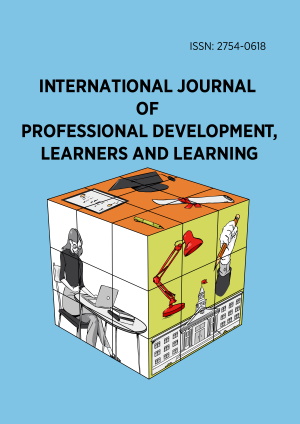Research Article
Overview of the perceived Influence of Insecurity on Academic Performance in front lines Local Government Secondary Schools in Niger State, Nigeria
More Detail
1 Niger State College of Education, Minna, NIGERIA* Corresponding Author
International Journal of Professional Development, Learners and Learning, 6(1), January 2024, ep2407, https://doi.org/10.30935/ijpdll/14475
Submitted: 08 January 2024, Published: 17 April 2024
OPEN ACCESS 2950 Views 3016 Downloads
ABSTRACT
This study seeks to assess the perceived influenced of insecurity on academic performance among frontline local government areas in Niger State, Nigeria. Three objectives with corresponding research questions guided the study. Descriptive cross-sectional survey research design was adopted for the study. The population of the study comprised of all the key local government secondary schools with security challenge in Niger State, Nigeria this includes Kontagora, Magama, Mariga, Munya, Rafi, Rijau, Shiroro, and Wushishi. Purposive sampling technique was adopted to form the sample for the study. The instrument used for data collection for the study was researchers designed a questionnaire that was divided into three sections; level of insecurity, impact of insecurity, and measures implemented. The instrument (questionnaire) was validated by experts and Cronbach’s alpha’s value was computed to ascertain the internal consistency. The reliability coefficient of the questionnaire was obtained to be 0.81. The collected data were analyzed using mean and standard deviation with a criterion mean of 2.50 as the basis for judgment. A calculated mean score of 2.50 and above was interpreted as a perceived high-level impact of insecurity among frontline local government areas of Niger State.Top of Form Hence, it was recommended among others that Niger State Government in conjunction with local government should make a concerted efforts in prioritize and address insecurity as it is fundamental to improving academic performance in the affected regions in addition to implement and reinforce robust security measures within schools, supported by proactive counselling services and comprehensive support systems to alleviate students’ fears and create an environment conducive to learning.
CITATION (APA)
Usman, H. (2024). Overview of the perceived Influence of Insecurity on Academic Performance in front lines Local Government Secondary Schools in Niger State, Nigeria. International Journal of Professional Development, Learners and Learning, 6(1), ep2407. https://doi.org/10.30935/ijpdll/14475
REFERENCES
- Adekunle, A. O., Babatunde, R. O., & Ayeni, M. D. (2023). Impact analysis, risk perception and adoption of mitigation strategies among farmers in Niger State, Nigeria, Africa. La Calera [The Calera], 23(40). https://doi.org/10.5377/calera.v23i40.15978
- Aleyomi, M. B., & Nwagwu, R. C. (2023). Strategic model for Nigeria’s security and socioeconomic development. African Identities, 21(1), 66-86. https://doi.org/10.1080/14725843.2020.1828041
- Egonu, N., Adibe, R., Nnamani, R., Nwaogaidu, J., & Oranye, H. U. (2023). Nigerian State and the management of armed conflicts: Rethinking the amnesty approach. Security Journal. https://doi.org/10.1057/s41284-023-00377-2
- Jimoh, H. O., Gyan, D. A., & Adeniyi, N. A. (2022). Evaluating effects of insecurity of school environment on academic performance and school enrollment of secondary school students in Katsina State. Bije-Bichi Journal of Education, 16(1), 120-132.
- Mutudi, M., Nehemia, M., & Iyamu, T. (2020). Qualitative methods, lesson for information systems researchers. In A. Tatnall (Ed.), Encyclopedia of education and information technologies (pp. 1-8). Springer. https://doi.org/10.1007/978-3-319-60013-0_186-1
- Ojukwu, M. O., & Nwanna, A. C. (2015). Influence of insecurity of school environment on the behaviour of secondary school students in Isiala-Ngwa North and South Local Government Area of Abia State, Nigeria. International Journal of Education & Literacy Studies, 3(4), 49-55. https://doi.org/10.7575/aiac.ijels.v.3n.4p.49
- Ojukwu, M. O., & Onuoha, R. C. (2016). Influence of insecurity of school environment on the psychosocial adjustment of secondary school students in Imo State, Nigeria. Journal of Sustainable Agriculture and the Environment, 15(3).
- Okpaga, A., Chijioke, U. S., & Eme, O. I. (2012). Activities of Boko Haram and insecurity question in Nigeria. Arabian Journal of Business and Management Review, 1(9), 77. https://doi.org/10.12816/0002163
- Okwuwada, N. (2023). The modern-day consequences, causes, and nature of kidnapping, terrorism, banditry, and violent crime in Nigeria: A comprehensive analysis. MPRA. https://mpra.ub.uni-muenchen.de/117671/
- Olapeju, R. M., & Peter, A. O. (2021). The impact of banditry on Nigeria’s security in the Fourth Republic: An evaluation of Nigeria’s Northwest. Zamfara Journal of Politics and Development, 2(1), 26-26.
- Sanchi, I. D., Alhassan, Y. J., Ajibade, O. V., & Sabo, Y. A. (2022). Implications of rural banditry on educational development in Nigeria: A critical review. Direct Research Journal of Social Science and Educational Studies, 10(5), 77-87.
- Umar, M. K., Ibrahim, U. K., & Adamu, I. (2023). Effects of insecurity on students’ academic performance in Katsina State schools–A case study of the frontline local government areas. Modern Journal of Social Science and Humanities, 18, 1-9.

 The articles published in this journal are licensed under the CC-BY Creative Commons Attribution International License.
The articles published in this journal are licensed under the CC-BY Creative Commons Attribution International License.